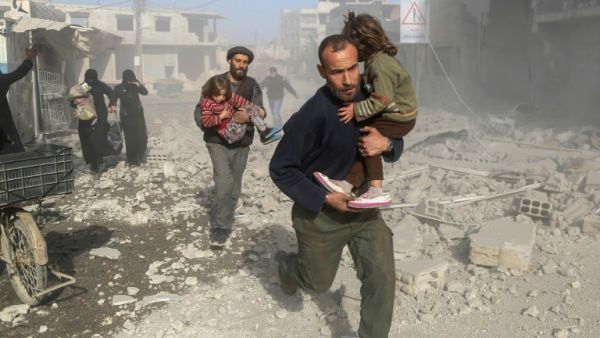BEIRUT: Evacuations of the critically ill in besieged Eastern Ghouta have started after a prisoner release deal was agreed between Damascus and a rebel faction, an International Committee of the Red Cross spokesperson said Wednesday.
Ingy Sedky, spokesperson for the ICRC in Damascus, confirmed that the Syrian government had given them and the Syrian Red Crescent permission to facilitate the evacuation of 29 patients on the agreed list of evacuees.
She said that four patients were evacuated late Tuesday accompanied by family members, and were all receiving treatment in hospitals in Damascus.
The patients, including three children and one adult, were being treated for cancer, kidney failure and hemophilia. “The evacuation process is ongoing,” she said. “It’s hard to tell when the rest of the patients will all be evacuated.”
Sedky also acknowledged that the number of evacuees was very small compared to the need. “There’s more to be done but we are hopeful for future evacuations.”
The agreement was brokered between the Syrian government in Damascus and Jaish al-Islam, a rebel faction that largely controls the enclave west of the capital. Hamza Briqadar, a spokesperson from Jaish al-Islam, said that the regime agreed to allow the evacuation of the 29 patients in exchange for the group’s release of detainees of the same number. Five have so far been released.
This comes two months after the United Nations asked Syrian President Bashar Assad to allow the evacuation of the 29 patients.
Damascus did not immediately comment on the evacuation.
- Feature: Syria's Phantom 'De-Escalation Zones'
- Feature: The Chinese Jihadist Separatists Fighting in Syria
Mohamad Katoub, advocacy manager at the Syrian American Medical Society in Turkey, said that he hoped most of the patients would leave Ghouta in the next 48 hours but was “not optimistic.” He said that there were concerns from the evacuees that they may be arrested in Damascus, which was impacting their decision on whether to leave.
Katoub also said that 641 people are in need of urgent care in Eastern Ghouta and that the humanitarian situation is deteriorating. “It is a minor step from the Syrian regime,” he said. “We are concerned about the wider needs inside Ghouta and the pressure it is under.”
He also said that SAMS received news Wednesday from a family of a 6-month-old baby who was on the list to be evacuated that the child had died a few days before. Since July, 18 patients have died waiting for treatment, he added.The impact of the siege has meant that patients are unable to get access to the necessary medicine and treatment.
Dr. Fayez Orabi, a doctor in Eastern Ghouta, said that “there is a lack of medicines and medical devices,” making it difficult to treat the injured being brought in greater numbers.
The densely populated Eastern Ghouta has been under siege since 2013 and has been described by the U.N. as suffering from the worst malnutrition seen since the start of the war.
Despite being officially one of the four “de-escalation zones” in Syria, fighting continues. The government was accused in November 2016 by U.N. humanitarian operations chief Stephen O’Brien of using the siege as “deliberate tactic of cruelty.”
A UNICEF survey in November said that 11.9 percent of children under the age of 5 were suffering from acute malnutrition in Eastern Ghouta, home to around 400,000 people.
Meanwhile, Syria’s Foreign Ministry accused Turkish President Recep Tayyip Erdogan of supporting terrorism and said it bears “prime responsibility for the bloodshed in Syria,” according to the Associated Press.
This followed comments earlier in the day in which Erdogan called Assad a “terrorist” and said he should have no part in Syria’s post-conflict future during a news conference in Tunis.
This was a sharp departure from what many have considered to be Erdogan taking an increasingly softer stance with Assad.
A supporter of some opposition groups on the ground, Turkey has been working with Russia and Iran in peace talks.
The trio announced after a round of talks in the Kazakh capital Astana last week that the next Sochi congress in Russia will take place at the end of January, but did not confirm who would attend from the opposition. Forty opposition and rebel groups said Tuesday that they would not attend the congress as it was an attempt to circumvent the U.N.-backed talks in Geneva.
According to the Kurdish Firat News Agency, Sipan Hemo, a People’s Protection Units (YPG) commander, said Moscow “had promised” that 155 Kurdish representatives would participate at Sochi next month.
Turkey views the YPG as a terrorist organization and is hostile to the idea of Kurdish participations in negotiations.
This article has been adapted from its original source.








